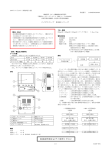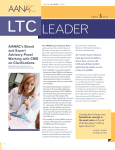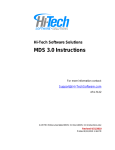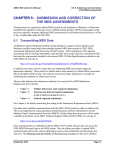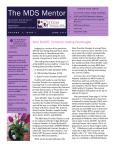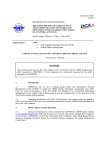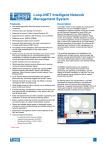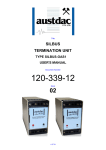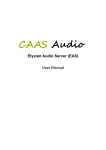Download Assessment - MHA - An Association of Health Care Providers
Transcript
Handouts Prepared By: Jane Belt, MS, RN, RAC-MT Plante Moran Clinical Group [email protected] 614-222-9020 plantemoran.com plantemoran.com 2 ©Plante Moran Clinical Group 2013 1 614-222-9020 Objectives 1. Review of the assessment types and when to use them. 2. Delineation of the items in Sections K 3. Use of the Care Area Assessments for Dietary 4. Questions and Answers plantemoran.com 3 The Resident Assessment Instrument Omnibus Reconciliation Act (OBRA)’87 the nursing home reform law - provided an opportunity to ensure good clinical practice by creating a regulatory framework that recognized the importance of comprehensive assessments as the foundation for planning and care delivery to nursing home residents plantemoran.com ©Plante Moran Clinical Group 2013 4 2 614-222-9020 Certification Requirements F272 The intent of the assessment is to provide the facility with ongoing assessment information to develop a care plan, to provide appropriate care and services for each resident, and to modify the care plan and care/services based on the resident’s status plantemoran.com 5 “Right” Forms and Manual All Item Sets must indicate the correct version (1.10.4) and date (04/01/2012): Long-Term Care Facility Resident Assessment Instrument User’s Manual – May 2013 – v1.10 https://www.cms.gov/NursingHomeQualityInits/45_NHQIM DS30TrainingMaterials.asp#TopOfPage More updates expected in late summer for 10/01/13 plantemoran.com ©Plante Moran Clinical Group 2013 6 3 614-222-9020 RAI Process Purpose To promote the highest practicable level of functioning for a resident through an assessment of triggered care areas To understand the causes and contributing factors of identified problems Development of resident-specific care plan based on identified problems, needs, strengths plantemoran.com 7 The Overall RAI Framework Minimum Data Set (MDS) + Care Area Assessments (CAAs) + Utilization Guidelines + Care plan = plantemoran.com ©Plante Moran Clinical Group 2013 8 4 614-222-9020 RAI Philosophy – Problem Solving START Assessment (MDS/other) Decision-making Problem identification (CAAs/other) Care Plan Implementation Care Plan Development Evaluation 9 plantemoran.com RAI Process Components Minimum Data Set (MDS) Core set of standardized screening, clinical, physical, functional, and psychosocial status items that form the foundation of the comprehensive, functional status assessment plantemoran.com ©Plante Moran Clinical Group 2013 10 5 614-222-9020 RAI Process Components Care Area Triggers (CATs) MDS answer options that provide clues to possible problems, needs, strengths in any of the 20 specific care areas (i.e., delirium, nutrition, mood, pain…) vision pain mood ADLs B&B plantemoran.com 11 RAI Process Components Care Area Assessments (CAAs) MDS is not a complete assessment – it is a screening tool Further assessment of entire triggered care area is required, using sound clinical problem-solving and decisionmaking skills, to be able to draw conclusions about problems, needs and strengths plantemoran.com ©Plante Moran Clinical Group 2013 12 6 614-222-9020 RAI Process Components Utilization Guidelines Provide instructions for when and how to use RAI Include instructions for completion of RAI as well as structure frameworks for synthesizing MDS and other clinical information https://www.cms.gov/manuals/downloads/som107ap _pp_guidelines_ltcf.pdf plantemoran.com 13 RAI Process Components Six General Care Planning Areas 1. Functional status 2. Rehabilitation/restorative nursing 3. Health maintenance 4. Discharge potential The how to for achieving the OBRA philosophy 5. Medications 6. Daily care needs plantemoran.com ©Plante Moran Clinical Group 2013 14 7 614-222-9020 The Balancing Act PPS OBRA Different Equal Importance, BUT… Regulations Time Situations Payment frames systems plantemoran.com Grouper criterion Optimization strategies 15 OBRA Schedule Comprehensive (MDS/CAAs/Care Plan) Admission – 14 days Non-Comprehensive (MDS) Quarterly – 92 days ARD to ARD Significant Correction to Prior Annual – 366 days ARD to ARD Quarterly (SCQA) – 14 days Significant Change in Status Entry record – entry + 7 days (SCSA) – 14 days Significant Correction to Prior Comprehensive (SCPA) – 14 d Discharge (return anticipated or return not anticipated) – 14 days Death in facility – DOD + 7 days plantemoran.com ©Plante Moran Clinical Group 2013 16 8 614-222-9020 MDS 3.0 Assessment Types Federal OBRA Reason for Assessment A0310A Nursing Home Comprehensive (NC) Item Set Code • Admission assessment (required by day 14) 01 • Annual assessment 03 • Significant change in status assessment 04 • Significant correction to prior comprehensive assessment 05 plantemoran.com 17 Comprehensive Assessments Admission (A0310A = 01) Day begins at 12:00 AM No matter time admitted = Day 1 of admission Ends at 11:59 PM ARD = no later than 14th day of admission MDS completion date (Z0500B) and CAAs completion date (V0200B2) = no later than 14th day Care plan completion date (V0200C2) = CAAs completion date + 7 days Submission = care plan completion date + 14 days plantemoran.com ©Plante Moran Clinical Group 2013 18 9 614-222-9020 Comprehensive Assessments Annual (A0310A = 03) • ARD = no later than ARD of previous comprehensive + 366 days AND ARD of previous quarterly + 92 days • MDS completion date (Z0500B) and CAAs completion date (V0200B2) = ARD + 14 days • Care plan completion date (V0200C2) = CAAs completion + 7 days • Submission = care plan completion date + 14 days plantemoran.com 19 Comprehensive Assessments Significant change in status (SCSA)(A0310A = 04): • ARD = no later than 14th day after determination • MDS completion date (Z0500B) and CAAs completion date (V0200B2) = no later than 14th day after determination (ARD + 14 days) • Care plan completion date = CAAs completion date + 7 days • Submission = care plan completion + 14 days plantemoran.com ©Plante Moran Clinical Group 2013 20 10 614-222-9020 Scheduled PPS Schedule Defined days within which the ARD must be set Reason A0310B ARD Days Grace Days Payment Days 5-day 01 1–5 6–8 1 thru 14 14-day 02 13 – 14 15 – 18 15 thru 30 30-day 03 27 – 29 30 – 33 31 thru 60 60-day 04 57 – 59 60 – 63 61 thru 90 90-day 05 87 – 89 90 – 93 91 thru 100 MDS plantemoran.com 21 Change of Therapy (COT) Assessment OPTION (page 2-51) COT has a rolling seven (7) day observation once a therapy RUG has been established and is required when the RUG category for rehab or rehab with extensive services will change for billing purposes – EXCEPT…….. If day seven (7) of the COT observation period falls within the ARD window of a scheduled PPS assessment, the SNF may choose to complete the PPS assessment ALONE by setting the ARD of the scheduled PPS MDS for an allowable day that is on or prior to Day 7 of the rolling window – the COT window is reset plantemoran.com ©Plante Moran Clinical Group 2013 22 11 614-222-9020 Change of Therapy (COT) Assessment Clarification (page 2-51) In cases where a resident is discharged from the SNF on or prior to Day 7 of the COT observation period, then no COT OMRA is required RAI Manual goes on to say: “If a facility chooses to complete the COT OMRA in this situation they may combine the COT OMRA with the discharge assessment” THINK ABOUT THAT ----- be careful!!!! COT pays backwards!!!! plantemoran.com 23 A Quick Word of Caution Change of Therapy Assessments (COT) Check RUG payment determined MDS ARD 1 Every 7 days – checking for need to do COT 2 3 4 5 6 If change in RUG and COT necessary – payment changes backwards plantemoran.com ©Plante Moran Clinical Group 2013 7 COT Day 1 re-starts again Check for RUG change 24 12 614-222-9020 Possible COT Signals Considerations – could trigger a COT: Missed treatment sessions (resident illness, scheduling conflict, family visit, outing, refusals, withheld treatments, holidays with missed sessions, therapist illness) Partial treatment sessions Changes in rehab intensity and/or disciplines Discontinuation of or starting therapies Inconsistent delivery and poor communication plantemoran.com 25 Assessment Reference Date (ARD) Timing the same (366 days for the annual and 92 days for the quarterly) Timing for next assessment based on the ARD Anything that happens after the ARD will not be reflected on the MDS The facility is required to set the ARD on the MDS form itself or in the facility software within the appropriate timeframe of the assessment being completed plantemoran.com ©Plante Moran Clinical Group 2013 26 13 614-222-9020 Instructions for Coding “8” in ADLs Code 8, ADL activity itself did not occur during the entire period: if the activity did not occur or family and/or nonfacility staff provided care 100% of the time for that activity over the entire 7day period. plantemoran.com Know the ADL Definitions of Self-Performance 0 Independent 1 Supervision 2 Limited Assistance Staff’s hand on top Extensive Assistance 3 Staff’s hand underneath - hand, finger, arm, leg, hip, foot of resident 4 Total Dependence 7 Activity Occurred Only Once or Twice 8 Activity Did Not Occur plantemoran.com ©Plante Moran Clinical Group 2013 14 28 614-222-9020 Section K – Swallowing/Nutritional Status Intent Assess the many conditions that could affect resident’s ability to maintain adequate nutrition and hydration Items cover: Swallowing disorders Height and weight Weight change Nutritional approaches plantemoran.com 29 K0100 – Assessment K0100 Swallowing Disorder Ask resident about any difficulty swallowing during the look-back period Ask about each symptom Observe resident to identify any symptoms During meals At times resident is eating, drinking, or swallowing Interview staff members across all shifts Review medical record – nursing, physician, dietitian, ST notes, dental history or problems plantemoran.com ©Plante Moran Clinical Group 2013 30 15 614-222-9020 Section K0100 – Swallowing Code a symptom even if it only occurred once during the 7-day look back Do NOT code a swallowing problem if interventions have been successful in treating the problem – the intervention is successful plantemoran.com 31 Section K0200A – Height Base height on the most recent height since the most recent admission/entry or reentry. Measure and record height in inches Measure height consistently over time in accordance with the facility policy and procedure, which should reflect current standards of practice (shoes off, etc.) For future assessments, check medical record. If the last height recorded was > 1 year ago, measure and record the resident’s height again Record height to the nearest whole inch Use mathematical rounding plantemoran.com ©Plante Moran Clinical Group 2013 32 16 614-222-9020 Section K0200B – Weight Base weight on the most recent measure in the last 30 days Measure weight consistently over time using facility policy and procedure, reflecting current standards of practice (shoes off, etc.) For future assessments, check the medical record and enter the weight taken within 30 days of the ARD of this assessment If last recorded weight was taken > than 30 days prior to the ARD of this assessment or previous weight is not available, weigh the resident again If the resident’s weight was taken more than once during the preceding month, record the most recent weight Use mathematical rounding and use this number before completing the weight loss or weight gain calculations plantemoran.com 33 Section K – Swallowing and Nutritional Status Weight Loss (K0300): From the medical record, compare the resident’s weight in the current observation period to his or her weight in the observation period 30 days ago. (p. K-5) From the medical record, compare the resident’s weight in the current observation period (deleted, 7-day look back) to his or her weight in the observation period 30 days ago If the current weight is less than the weight in the observation period 30 days ago, calculate the percentage of weight loss plantemoran.com ©Plante Moran Clinical Group 2013 34 17 614-222-9020 Weight Loss (K0300) - continued: From the medical record, compare the resident’s weight in the current observation (deleted, 7-day look back) period to his or her weight in the observation period 180 days ago If the current weight is less than the weight in the observation period 180 days ago, calculate the percentage of weight loss “Current observation period” defined in K0100, Weight = “Base weight on the most recent measure in the last 30 days. If the last recorded weight was taken more than 30 days prior to the ARD of this assessment or previous weight is not available, weigh the resident again.” (p. K-3) plantemoran.com 35 Calculate Percentages of Weight Loss Use mathematical rounding before calculation Multiply previous weight by 0.95 to determine resident weight after 5% weight loss Example: 160 pounds X 0.95 = 152 pounds. A resident whose weight drops from 160 to 152 pounds or less has experienced 5% or more weight loss Multiply previous weight by 0.90 to determine resident weight after 10% weight loss Example: 160 pounds X 0.90 = 144 pounds. A resident whose weight drops from 160 to 144 pounds or less has experienced 10% or more weight loss plantemoran.com ©Plante Moran Clinical Group 2013 36 18 614-222-9020 Definitions Physician-Prescribed Weight Loss Regimen: a weight reduction plan ordered by the resident’s physician with the care plan goal of weight reduction. May employ a calorie-restricted diet or other weight loss diets and exercise. Also includes planned diuresis. It is important that weight loss is intentional Body Mass Index (BMI): a number calculated from a person’s weight and height – used as a screening tool to identify possible weight problems for adults plantemoran.com 37 Coding Code weight loss based on whether it was planned/managed or unplanned/unmanaged plantemoran.com ©Plante Moran Clinical Group 2013 38 19 614-222-9020 Section K – Swallowing and Nutritional Status K0310 – Weight Gain Item compares the resident’s weight in the current observation period with his or her weight at two snapshots in time: At a point closest to 30-days preceding the current weight At a point closest to 180-days preceding the current weight Physician-Prescribed Weight-Gain Regimen: the weight gain was planned and pursuant to a physician’s order plantemoran.com 39 Section K – K0510 Both columns count for RUGs Reimbursement items plantemoran.com ©Plante Moran Clinical Group 2013 Enteral feeding formulas – NOT coded in C. Therapeutic (D.) only if managing problematic condition, such as diabetes 40 20 614-222-9020 K0510 Nutritional Approaches Coding Review the medical record to determine if any of the listed nutritional approaches were received performed during the 7-day look back period. Coding Instructions for Column 1 Check all nutritional approaches performed prior to admission/entry or reentry to the facility and within the 7-day day look-back period. Leave Column 1 blank if the resident was admitted/entered or reentered the facility more than 7 days ago. plantemoran.com 41 K0510 Nutritional Approaches Coding Coding Instructions for Column 2 Check all nutritional approaches performed after admission/entry or reentry to the facility and within the 7 day look-back period K0510A. parenteral/IV feedings K05010B. feeding tube – nasogastric or abdominal (PEG) K0501C. mechanically altered diet – requires change in texture of food or liquids (e.g., pureed food, thickened liquids) K05010D. therapeutic diet (e.g., low salt, diabetic, low cholesterol) K05010Z. none of the above plantemoran.com ©Plante Moran Clinical Group 2013 42 21 614-222-9020 K0510A – Parenteral/IV Feeding Code when supporting documentation reflects need for additional fluids addressing nutrition or hydration need: IV fluids or hyperalimentation, including TPN administered continuously or intermittently IV fluids running at Keep Vein Open (KVO) IV fluids contained in IV piggybacks Hypodermoclysis and subcutaneous ports in hydration therapy IV fluids can be coded if needed to prevent dehydration if the additional fluid intake is specifically needed for nutrition and hydration and documented as such plantemoran.com 43 K0510A – Parenteral/IV Feeding Do NOT code the following in K0510A: IV medications IV fluids administered as a routine part of an operative or diagnostic procedure or recovery room stay IV fluids administered solely as flushes IV fluids administered in conjunction with chemotherapy or dialysis plantemoran.com ©Plante Moran Clinical Group 2013 44 22 614-222-9020 Definitions K0510A. Parenteral/IV Feeding = introduction of a nutritive substance into the body by means other than the intestinal tract (e.g., subcutaneous, intravenous) K0510B. Feeding tube = presence of any type of tube that can deliver food/nutritional substances/fluids/medications directly into the gastrointestinal system. Examples include, but are not limited to: nasogastric tubes, gastrostomy tubes, jejunostomy tubes, percutaneous endoscopic gastrotomy (PEG) tubes plantemoran.com 45 Definitions K0510C. Mechanically altered = a diet specifically prepared to alter the texture or consistency of food to facilitate oral intake. Examples include: soft solids, pureed foods, ground meat, and thickened liquids K0510D. Therapeutic diet = a diet intervention ordered by a health care practitioner as part of the treatment for a disease or clinical condition manifesting an altered nutritional status, to eliminate, decrease, or increase certain substances in the diet (e.g., sodium, potassium) (ADA 2011) plantemoran.com ©Plante Moran Clinical Group 2013 46 23 614-222-9020 Coding Tips Therapeutic diets are not defined by the content of what is provided or when it is served, but WHY the diet is required A nutritional supplement (house supplement or packaged) given as part of the treatment for a disease or clinical condition manifesting in altered nutrition status, does not constitute a therapeutic diet, but may be PART of a therapeutic diet. Supplements only coded when administered as a part of a therapeutic diet to manage problematic health conditions plantemoran.com 47 K0700 Percent Intake by Artificial Route Only coded if column 1 and/or column 2 are checked for K0510A and/or K0510B plantemoran.com ©Plante Moran Clinical Group 2013 48 24 614-222-9020 K0700A Proportion of Total Calories Received through Parenteral or Tube Feedings in Last 7 Days Review records to determine intake If resident took no food or fluids by mouth or just sips of fluid, stop here and code “3”, 51% or more If oral intake more than this, total oral intake calories and total tube intake calories. Divide the tube calories by the total calories X 100 = % of calories by tube feeding plantemoran.com 49 K0700B Average Fluid Intake per Day by IV or Tube Feeding in Last 7 Days Review intake records from the last 7 days Add up total amount of fluids received each day by IV and/or tube feeding only Divide this total fluid intake by 7 Divide by 7 even if the resident did not receive IV fluids and/or tube feeding on each of the 7 days plantemoran.com ©Plante Moran Clinical Group 2013 50 25 614-222-9020 M1200 Reminders Review the medical record; speak with direct care staff Observe the resident Based on an individualized nutritional assessment plantemoran.com 51 M1200D. M1200D. Nutrition or Hydration intervention to Manage Skin Problems Dietary measures received by the resident for the purpose of preventing or treating specific skin conditions, e.g., wheat-free diet to prevent allergic dermatitis, high calorie diet with added supplementation to prevent skin breakdown, high-protein supplementation for wound healing plantemoran.com ©Plante Moran Clinical Group 2013 52 26 614-222-9020 More M1200D. M1200D Nutrition or Hydration Interventions to Manage Skin Problems Provides additional instruction and enhanced examples. Goal to illustrate that the use of vitamins and mineral supplements are utilized only if nutritional deficiencies have been confirmed or suspected through thorough assessment – not automatically implemented Additional supplementation is not automatically required for pressure ulcer management. Any interventions should be specifically tailored to the resident’s needs, condition, and prognosis plantemoran.com 53 RAI Process Components CAA Summary (Section V) Provides location for documentation of triggered care areas and decisions whether to proceed to care planning or not plantemoran.com ©Plante Moran Clinical Group 2013 54 27 614-222-9020 V0200A – CAA Results Use “Location and Date of CAA documentation” column to note where CAA information and decision-making documentation can be found in the medical record In the column “Care Planning Decision” mark whether the triggered care area is addressed in the care plan plantemoran.com 55 What are the CAAs? CAA process framework. Guides the review of triggered areas and clarification of a resident’s functional status and related causes of impairments. Basis for additional assessment of potential issues, including related risk factors. Assessment of causes and contributing factors gives the IDT additional information to help develop a comprehensive plan of care After completing CAA evaluation and analysis, a clinical decision is made about whether the identified problem is, in fact a problem or relevant issue plantemoran.com ©Plante Moran Clinical Group 2013 56 28 614-222-9020 Care Area Assessment Triggers The trigger (CAT) is an MDS response indicating clinical factors exist that may or may not represent a condition that should be care planned When a resident’s status on a particular MDS item matches one of the CATs the related care area is triggered for further assessment plantemoran.com 57 Care Area Assessment Triggers Triggers flag conditions that warrant further investigation: a) single response, b) combination of more than one response; c) comparison of resident’s current status and prior assessment The trigger is a hint, a clue, a flag – just a small piece of information and only the beginning of the assessment process plantemoran.com ©Plante Moran Clinical Group 2013 58 29 614-222-9020 12. Nutritional Status The Nutritional Status CAA process reflects the need for an in-depth analysis of residents with impaired nutrition and those who are at nutritional risk. This CAA triggers when a resident has or is at risk for a nutrition issue/condition. Some residents who are triggered for follow-up will already be significantly underweight and thus undernourished, while other residents will be at risk of under-nutrition. This CAA may also trigger based on loss of appetite with little or no accompanying weight loss and despite the absence of obvious, outward signs of impaired nutrition. plantemoran.com 59 CAT Logic Tables MDS 3.0 trigger logic is complex – CAT logic tables located within each CAA description (RAI Manual pages 4-16 to 4-41) plantemoran.com ©Plante Moran Clinical Group 2013 60 30 614-222-9020 Care Areas Triggered care areas form a clinical link between CAA MDS and care planning decision POC MDS CAAs cover the majority of problem areas known to be problematic for NH residents Other areas may need assessment as well Triggered CAA must be assessed may or may not warrant being addressed by care plan plantemoran.com 61 20 CAAs in the MDS 3.0 1. 2. 3. 4. 5. 6. 7. 8. 9. 10. . Delirium Cognitive Loss/Dementia Visual Function Communication ADL Function/Rehabilitation Potential Urinary Incontinence and Indwelling Catheter Psychological Well-being Mood State Behavioral Symptoms Activities plantemoran.com ©Plante Moran Clinical Group 2013 62 31 614-222-9020 20 CAAs in the MDS 3.0 11. 12. 13. 14. 15. 16. 17. 18. 19. 20. . Falls Nutritional Status Feeding Tube Dehydration Dental Care Pressure Ulcers Psychotropic Drugs Physical Restraints Pain Return to Community plantemoran.com 63 CAA Process Evaluate triggered areas, but CAAs do not provide exact detail on how to select pertinent interventions for care planning Interventions must be individualized and based on effective problem solving and decision making approaches to all of the information available for each resident Care Area Triggers (CATs) identify conditions that require evaluation because of possible impact on specific issues and/or conditions, or the risk of issues and/or conditions plantemoran.com ©Plante Moran Clinical Group 2013 64 32 614-222-9020 CAA Process Triggered items may or may not represent a condition that should or will be addressed in the care plan Significance and causes of any given trigger may vary for different residents or in different situations for the same resident Different CATs may have common causes, or various items associated with several CATs may be connected plantemoran.com 65 CAA Process Indicate care area needs to be assessed more completely prior to making care planning decisions Triggered care area assessment may identify causes, risk factors, and complications associated with the care area condition Plan of care addresses these factors with the goal of promoting the resident’s highest practicable level of functioning: (1) improvement where possible or (2) maintenance and prevention of avoidable declines A risk factor increases the chances of having a negative outcome or complication plantemoran.com ©Plante Moran Clinical Group 2013 66 33 614-222-9020 Care Area Assessment No specific tool mandated for completing the further assessment of the triggered areas No specific guidance on how to understand or interpret the triggered areas Instead, facilities are instructed to identify and use tools that are current and grounded in current clinical standards of practice, such as evidence-based or expert-endorsed research, clinical practice guidelines, and resources. When applying these evidence-based resources to practice, the use of sound clinical problem solving and decision making (“critical thinking”) skills is imperative plantemoran.com 67 Conducting the Assessment Step 1: Identify the trigger Usually a sign, symptom, or other indicator of possible problem, need, or strength Example: Weight loss - loss of 5% or more in the last month or loss of 10% or more in last 6 months plantemoran.com ©Plante Moran Clinical Group 2013 68 34 614-222-9020 Conducting the Assessment Step 2 : Identify the triggered Care Area Example: 1 or 2 – YES, on physician-prescribed weight-loss regimen or YES, not on physician-prescribed weight-loss regimen (K0300 = 1 or 2 ) triggers Nutritional Status care area plantemoran.com 69 Conducting the Assessment Step 3 : Conduct thorough assessment of the entire Care Area Include factors that could cause or contribute to the symptom Include factors for which the symptom places the resident at risk Some factors will be on the MDS, many will not plantemoran.com ©Plante Moran Clinical Group 2013 70 35 614-222-9020 Conducting the Assessment Tools Requirement Must be current, evidence-based or expertendorsed research and clinical practice guidelines/resources The facility should be able to identify the resources they use upon request Requirement is consistent with F492 – services must meet professional standard of quality plantemoran.com 71 Appendix C Resources Staff should follow their facility’s chosen protocol or policy for performing the CAA Resources provided in Appendix C are not mandated CMS does not endorse the use of any particular resource(s) including those in Appendix C Resources selected may be used outside of RAI process also plantemoran.com ©Plante Moran Clinical Group 2013 72 36 614-222-9020 Conducting the Assessment Tools Option 1 Review of Indicators for each care area provided in Appendix C Each provides a checklist of indicators that guides the assessment for the particular care area Also provides location and guidelines for documentation plantemoran.com 73 Conducting the Assessment Tools Option 2 Appendix C also offers a list of resources that may be used for this purpose May be accessed online or through professional associations or other organizations Not an exhaustive list – providers are free to use others that meet regulatory requirement plantemoran.com ©Plante Moran Clinical Group 2013 74 37 614-222-9020 Other Care Area General Resources Not specific to any particular care area – a general listing of known clinical practice guidelines that may be used in completing the RAI/CAA process plantemoran.com 75 Conducting the Assessment Step 4 : Draw conclusions based on the information collected What is causing or contributing to the problem for this resident? What is this resident at risk for related to the problem? What other health professionals should be involved? plantemoran.com ©Plante Moran Clinical Group 2013 76 38 614-222-9020 CAA Documentation Nature of the issue or condition - what is the problem for this resident? Causes and contributing factors Complications affecting or caused by the care area for this resident Risk factors that arise because of the presence of the condition Factors that must be considered in developing individualized care plan interventions Need for referrals to other health professionals plantemoran.com 77 CAA Documentation Written documentation of the CAA findings and decision-making process may appear anywhere in resident’s record No particular location or format is required Section V indicates Location and Date of CAA documentation related to decision-making plantemoran.com ©Plante Moran Clinical Group 2013 78 39 614-222-9020 CAA Documentation Helps explain basis for care plan by showing how the IDT determined that the underlying causes, contributing factors, and risk factors were related to the care area condition for a specific resident Indicate basis for decisions – why the findings require an intervention, and the rationale for selecting specific interventions plantemoran.com 79 CAA Documentation Popular Format Checklist with summary analysis plantemoran.com ©Plante Moran Clinical Group 2013 80 40 614-222-9020 Care Area Review of Indicators 1. For any triggered care area(s), conduct a thorough assessment using care area-specific resources 2. Check the box in the left column if the item is present for resident. Some of this information will be on the MDS some will not 3. In the right column next to each checked item provide supporting documentation regarding the basis or reason for checking the item, including the location and date of that information, symptoms, possible causal and contributing factor(s) for that item plantemoran.com 81 Care Area Review of Indicators 4. Obtain and consider input from resident and/or family/resident’s representative regarding the care area 5. Analyze findings in the context of their relationship to the care area. Include a review of indicators and supporting documentation, including symptoms and causal and contributing factors, related to the care area. Draw conclusions about the causal/contributing factors and effect(s) on the resident’s functional ability and document this information in Analysis of Findings section plantemoran.com ©Plante Moran Clinical Group 2013 82 41 614-222-9020 Care Area Review of Indicators 6. Decide whether referral to other health professionals is warranted and document decision 7. In Care Plan Considerations section, document if care plan will be developed and reason(s) why or why not 8. Transfer information regarding the CAA to the CAA Summary (Section V of the MDS) plantemoran.com 83 CAA Summary Referral plantemoran.com ©Plante Moran Clinical Group 2013 84 42 614-222-9020 CAA Process Documentation – focus on key issues: Why or why not will you address the specific conditions in the care plan What about the condition may affect the resident’s daily functioning Why did you decide the resident is at risk, that improvement is possible or the decline can be minimized How could the resident benefit from consultation with an expert in a particular area plantemoran.com 85 Remember Regardless of tool or format, documentation should walk through the evidence of and conclusions about the root causes, contributing factors, risk factors, referrals to other health professionals plantemoran.com ©Plante Moran Clinical Group 2013 86 43 614-222-9020 V0200 CAAs and Care Planning Documents: Which care areas triggered and require further assessment Whether or not a care area is addressed in the resident care plan Location and date of CAA information Reflects the IDT and resident’s decisions on which triggered conditions will be addressed in the care plan plantemoran.com 87 V0200A Column A - Care Area Triggered Facility uses the RAI triggering mechanism to determine which problem care areas require review and additional assessment Triggered care areas are checked in Column A plantemoran.com ©Plante Moran Clinical Group 2013 88 44 614-222-9020 V0200A Column B – Care Plan Coding Check Column B to indicate a decision to develop a new care plan, revise a care plan or continue a current care plan to address the problem(s) identified Must be completed within 7 days of completing the RAI plantemoran.com 89 V0200 Location and Date of CAA Information Indicates date and location of the CAA documentation plantemoran.com ©Plante Moran Clinical Group 2013 90 45 614-222-9020 plantemoran.com 91 OBRA MDS 3.0 Timing V0200B1 = Signature of RN coordinating the CAA process V0200B2 = Date that RN certifies that CAAs have been completed. The CAAs must be reviewed and completed no later than the 14th day of admission (admission date + 13 calendar days) and ARD + 14 days for an annual, significant change in status, or a significant correction to a prior full assessment V0200B2 (CAA Completion) is the date of completion for comprehensive assessments and cannot be earlier than Z0500A plantemoran.com ©Plante Moran Clinical Group 2013 92 46 614-222-9020 OBRA MDS 3.0 Timing V0200C1 = signature of person facilitating care planning decision-making. Person signing does not have to be an RN V0200C2 = date on which staff person completed care plan decision column Care plan must be completed within 7 days of the completion date (V0200B2) of assessment (MDS and CAAs). V0200B2 + 7 days = V0200C2 Date at V0200C2 times transmission for comprehensive assessments – must be sent within 14 days of V0200C2 (V0200C2 + 14 days) plantemoran.com 93 Care Planning Good assessment forms the solid basis CAAs are the link between the MDS and care plan Plan of care is driven by resident problems, strengths, needs, preferences and choices Care plan by IDT Answer the “so what now” question No required format or structure plantemoran.com ©Plante Moran Clinical Group 2013 94 47 614-222-9020 Care Planning Must have measurable goals and time tables Goals should have a subject, verb, modifier and time frame Mr. B will eat 75% of 2 meals daily within the next 3 months Approaches should identify what staff are to do and when they are to do it Dietary to discuss with Mr. B food favorites and dislikes Dietary to explore with nursing need for restorative eating program Nursing to provide hands-on assistance when shows signs of fatigue or frustration plantemoran.com 95 Care Planning What the care plan needs to do: Indicates interventions in place to prevent avoidable declines in functioning or functional levels Manage risk factors Address resident strengths Use current standards of practice in the care planning process Evaluate treatment objectives and outcomes of care plantemoran.com ©Plante Moran Clinical Group 2013 96 48 614-222-9020 Care Planning Respect the resident’s right to refuse treatment Allows resident to establish own goals Offer alternative treatment Use an interdisciplinary approach to care plan development to improve the resident’s functional abilities Involve the family and/or other resident representatives, if OK with the resident plantemoran.com 97 Care Planning Assess and plan for care sufficient to meet the care needs of new admissions Involve the direct care staff with the care planning process relating to the resident’s expected outcomes Address additional care planning areas that could be considered in the long-term care setting plantemoran.com ©Plante Moran Clinical Group 2013 98 49 614-222-9020 Questions?? Submit questions by dialing #6 to unmute the phone line After asking question, hit *6 to mute the phone line again plantemoran.com 99 Ideas for the next series? Evaluation Forms Preferably TODAY, but no later Sign-in Sheet than 1 week from today Audio Order Form Next – July 19 from 1:00 to 2:30 PM EST The Federal Focus on Unnecessary Medications plantemoran.com ©Plante Moran Clinical Group 2013 100 50 614-222-9020 plantemoran.com Thank you. Jane Belt Plante Moran Clinical Group [email protected] 614-222-9020 plantemoran.com 101 Resources RAI MDS Manual http://www.cms.gov/Medicare/QualityInitiatives-Patient-AssessmentInstruments/NursingHomeQualityInits/MDS30RAIManual.html MDS Training Materials https://www.cms.gov/NursingHomeQualityInits/45_N HQIMDS30TrainingMaterials.asp#TopOfPage SNF PPS Website https://www.cms.gov/SNFPPS/03_RUGIVEdu12.asp# TopOfPage plantemoran.com ©Plante Moran Clinical Group 2013 51 614-222-9020




















































